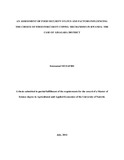| dc.description.abstract | Despite the remarkable progress in term of economic growth and poverty reduction made in
Rwanda since the tragedy of the 1994 genocide, more than 80 percent of its rural population is
still relying on subsistence agriculture practiced on small land, and this makes it difficult for
them to overcome the problem of food insecurity. The purpose of this study was to analyze food
security status and to determine households‘ food insecurity coping mechanisms as well as the
factors influencing the choice of food insecurity coping mechanisms. A sample of 234
households was selected based on systematic sampling procedure in 13 sectors of Gisagara
District, the study area. The first objective was addressed by using Food Consumption Score.
The results from this proxy show that 12.5 percent of households in the study area had low food
consumption score (food insecure) while 33.4 percent have borderline food consumption score
(moderately food insecure) and 51 percent of households were found to have acceptable food
consumption score (food secure). In terms of food insecurity coping mechanisms adopted by
households, the results show that casual labour based coping mechanism, assets based coping
mechanism, borrowing based coping mechanism, assistance based coping mechanism and
adjustment in food consumption based coping mechanism were the main coping mechanisms
adopted by households. To determine the factors influencing the choice of those coping
mechanisms, Multinomial Logit Regression Model (MNL) was used. Results from the estimation
of the MNL model revealed that among eight variables included in the model, six were found to
be significant, that is age, household size, land size, livestock ownership, cooperative
membership and total annual income. The findings of this study show that vulnerability to food
insecurity can be reduced by decreasing exposure to risks and shocks or by increasing the ability
to cope with different shocks. Policy interventions need to complement the positive effects of the
key findings of this study, key recommendations to enhance food security were suggested,
namely promoting income-generating activities, enhancing the cooperatives‘ efficiency, creating
employment opportunities and promoting the development of the livestock sector. | en_US |

